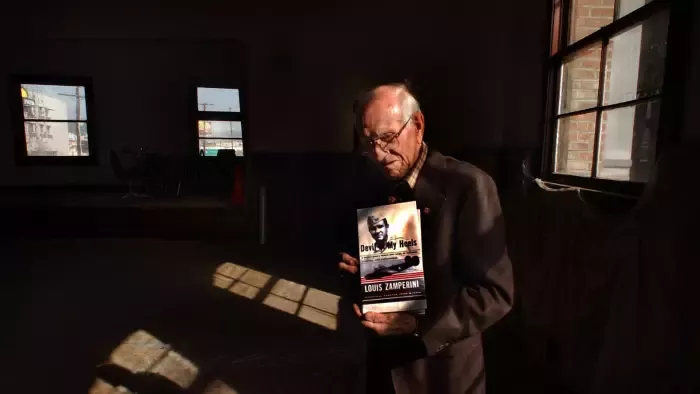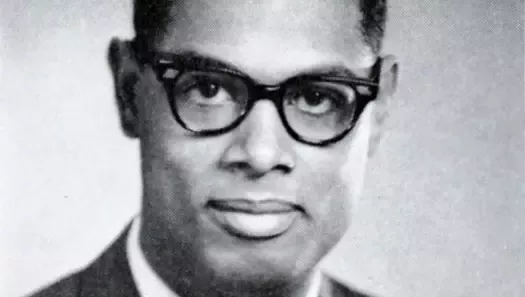WeSalute Awards
HeroVet: Louis Zamperini, Olympian, POW, and Inspiration for 2014 Movie "Unbroken"

On Christmas Day, 2014, movie theatres unveil "Unbroken," the WWII war drama film produced and directed by Angelina Jolie based on the 2010 nonfiction book by Laura Hillenbrand, "Unbroken: A World War II Story of Survival, Resilience, and Redemption." The Universal film, which revolves around the life of Olympic athlete Louis "Louie" Zamperini was offered in an advance screening in NYC at the USS Intrepid Museum for Veterans and VIPs, hosted by Veterans Advantage, The Woodruff Foundation, Fisher House and The Intrepid Foundation.
Veterans Advantage also recognizes Zamperini as a "HeroVet" here.
After training as a B-24 Liberator bombardier, Louis Zamperini flew combat missions with the 42nd Bomb Squadron of the 11th Bomb Group in the Pacific Theater until his aircraft was forced to crash into the Pacific Ocean on May 27, 1943. After 47 days in a life raft, he defied the odds to survive at sea in the Pacific and as a Japanese prisoner of war in WWII. He was given up for dead by his nation for two-and-a-half years, so his story of survival was a deeply solitary story. He fought and successfully conquered the emotional demons of a horrific war experience. Today, even after his death, Zamperini continues to inspire a new generation with his story of resilience, persistence and bravery.
FROM TROUBLE-MAKER TO OLYMPIAN TO AIRMAN
Louis Zamperini was born in 1917 in Olean, New York, the son of Italian immigrants. During the 1920s, his family moved to Torrence, California, where young "Louie" as he was called, was bullied because he could not speak English. To help him defend himself, his father taught him how to fight. Fighting, however, soon became a habit for the lad. He was often in trouble with his school and local law enforcement officials.
Fortunately, his older brother Pete, seeking to lead Louie off the path of delinquency, saw tremendous athletic potential in him and introduced him to the sport of running. From the start, Zamperini showed enormous talent and a love for the sport. In 1932, he set the world-record for the mile at 4 minutes and 21 seconds, and his times continued to improve towards the four-minute mark, which was not yet achieved by anyone. He received a scholarship from the University of Southern California, where he trained hard and qualified for 1936 Berlin Olympics.
At the games, Zamperini led the Americans and finished 8th in the 5,000 meters, with an extraordinary last lap of 56 seconds. He planned to continue his training and dreamed of winning the gold at the 1940 games. As WWII broke out and the Olympics were cancelled, Zamperini knew it was his duty to serve his country. He enlisted in the U.S. Army Air Force in 1941 and was deployed to Hawaii as a bombardier.
On May 17th, 1943, the B-24 carrying Zamperini went down over the Pacific. Zamperini and the plane’s pilot survived on a fragile raft for forty-seven days (a record), traveling 2,000 miles, before the Japanese Navy captured them. Zamperini was held in captivity and severely tortured until the end of the war.
REDEMPTION
Zamperini had survived captivity, but his harrowing experiences continued to plague him. Returning to civilian life as a war hero, he grappled with post-traumatic stress and alcoholism. His marriage came close to divorce.
The road to recovery was a long and difficult one for Louie. Fortunately, his wife Cynthia, showing remarkable kindness and support, introduced him to a young evangelist named Billy Graham. Zamperini credits him with saving his life. Through Graham’s teachings, Zamperini re-discovered his faith and learned, above all, the lessons of forgiveness.
In his first visit back to Japan, Zamperini met with many of his captors and quite literally, forgave them for their abuse of him in the POW camps. In 1988, he was asked to carry the Olympic torch in Nagano, Japan, not far from his WWII prison camp. Again, Zamperini converted what could have been a bittersweet memory to an exercise in forgiveness.
He reflected, “When I finished, all these young people were around me asking questions, wanting autographs. It was great. I just couldn’t believe it. The love these people offered me made me forget about the labor camp.”
Zamperini remained in excellent health well into his 90s, led a full life, until his death in July 2014 at the age of 97. Near the end, he walked a mile or more a day, regularly tended to yard work, and kept a balanced emotional and spiritual view of the world. He loved a good laugh and lived by his personal motto, “be hardy.”
SHARING HIS STORY
Zamperini worked to inspire many with his story of endurance and survival. As a motivational speaker, he toured the country and the world to share his life's experiences and the lessons he learned, particularly those associated with redemption.
He was especially dedicated to inspiring young people. In 1952, Zamperini started Victory Boys Camp. The organization helps the kind of boy Zamperini once was—the delinquent going in the wrong direction. By providing camp experiences that build confidence and life skills to high-school dropouts, Victory Boys Camp gives thousands of boys a chance at redemption.
In 2003, Zamperini, in conjunction with David Resnin, published Devil at My Heels: A WWII Hero’s Epic Saga of Torment, Survival and Forgiveness.
Zamperini also saw his story enter the limelight with the publication of Unbroken: A World War II Story of Survival, Resilience and Redemption, written by Lauren Hillenbrand (author of critically acclaimed Seabiscuit). The novel, another chronicle of Zamperini’s extraordinary story, reached #1 on the New York Times Best Seller List and was named the top book of 2010 by Time magazine. The movie of this story, "Unbroken," will be released at U.S. movie theaters on December 25, 2014.
Of the book, Zamperini said, “Not only is it a great novel, but a great true story of the history of World War II – it’s an encyclopedia because it is historical and absolutely 100% accurate.”
Over the years, Zamperini got the nickname “Lucky Louie.” Anyone who has heard and been inspired by his story, however, knows that his survival and redemption were not the products of his luck, but of his resilience, persistence and bravery. A true hero, Zamperini’s life reflected his steadfast character—or as he might say, his “hardiness.”
Image Credit: http://www.latimes.com/local/obituaries/la-me-louis-zamperini-20140704-story.html



